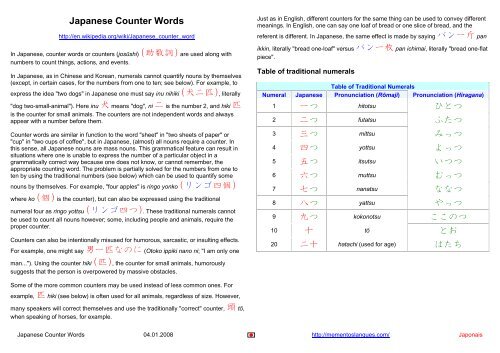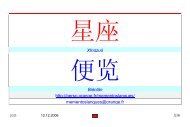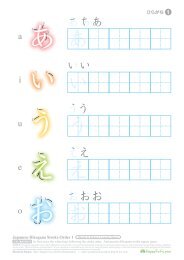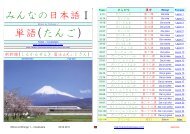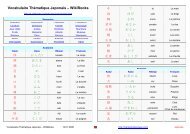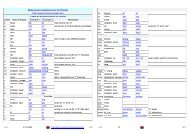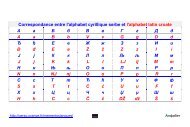Japanese Counter Words 一つ ひとつ 二つ ふたつ 三つ みっつ 四つ ...
Japanese Counter Words 一つ ひとつ 二つ ふたつ 三つ みっつ 四つ ...
Japanese Counter Words 一つ ひとつ 二つ ふたつ 三つ みっつ 四つ ...
You also want an ePaper? Increase the reach of your titles
YUMPU automatically turns print PDFs into web optimized ePapers that Google loves.
<strong>Japanese</strong> <strong>Counter</strong> <strong>Words</strong><br />
http://en.wikipedia.org/wiki/<strong>Japanese</strong>_counter_word<br />
In <strong>Japanese</strong>, counter words or counters (josūshi) ( 助 数 詞 ) are used along with<br />
numbers to count things, actions, and events.<br />
In <strong>Japanese</strong>, as in Chinese and Korean, numerals cannot quantify nouns by themselves<br />
(except, in certain cases, for the numbers from one to ten; see below). For example, to<br />
express the idea "two dogs" in <strong>Japanese</strong> one must say inu nihiki ( 犬 二 匹 ), literally<br />
"dog two-small-animal"). Here inu 犬 means "dog", ni 二 is the number 2, and hiki 匹<br />
is the counter for small animals. The counters are not independent words and always<br />
appear with a number before them.<br />
<strong>Counter</strong> words are similar in function to the word "sheet" in "two sheets of paper" or<br />
"cup" in "two cups of coffee", but in <strong>Japanese</strong>, (almost) all nouns require a counter. In<br />
this sense, all <strong>Japanese</strong> nouns are mass nouns. This grammatical feature can result in<br />
situations where one is unable to express the number of a particular object in a<br />
grammatically correct way because one does not know, or cannot remember, the<br />
appropriate counting word. The problem is partially solved for the numbers from one to<br />
ten by using the traditional numbers (see below) which can be used to quantify some<br />
nouns by themselves. For example, "four apples" is ringo yonko (リンゴ 四 個 )<br />
where ko ( 個 ) is the counter), but can also be expressed using the traditional<br />
numeral four as ringo yottsu (リンゴ 四 つ). These traditional numerals cannot<br />
be used to count all nouns however; some, including people and animals, require the<br />
proper counter.<br />
<strong>Counter</strong>s can also be intentionally misused for humorous, sarcastic, or insulting effects.<br />
For example, one might say 男 一 匹 なのに (Otoko ippiki nano ni; "I am only one<br />
Just as in English, different counters for the same thing can be used to convey different<br />
meanings. In English, one can say one loaf of bread or one slice of bread, and the<br />
referent is different. In <strong>Japanese</strong>, the same effect is made by saying パン 一 斤 pan<br />
ikkin, literally "bread one-loaf" versus パン 一 枚 pan ichimai, literally "bread one-flat<br />
piece".<br />
Table of traditional numerals<br />
Table of Traditional Numerals<br />
Numeral <strong>Japanese</strong> Pronunciation (Rōmaji) Pronunciation (Hiragana)<br />
1 一 つ hitotsu <strong>ひとつ</strong><br />
2 二 つ futatsu <strong>ふたつ</strong><br />
3 三 つ mittsu <strong>みっつ</strong><br />
4 四 つ yottsu よっつ<br />
5 五 つ itsutsu いつつ<br />
6 六 つ muttsu むっつ<br />
7 七 つ nanatsu ななつ<br />
8 八 つ yattsu やっつ<br />
9 九 つ kokonotsu ここのつ<br />
10 十 tō とお<br />
20 二 十 hatachi (used for age) はたち<br />
man..."). Using the counter hiki ( 匹 ), the counter for small animals, humorously<br />
suggests that the person is overpowered by massive obstacles.<br />
Some of the more common counters may be used instead of less common ones. For<br />
example, 匹 hiki (see below) is often used for all animals, regardless of size. However,<br />
many speakers will correct themselves and use the traditionally "correct" counter, 頭 tō,<br />
when speaking of horses, for example.<br />
<strong>Japanese</strong> <strong>Counter</strong> <strong>Words</strong> 04.01.2008 http://mementoslangues.com/ Japonais
List of <strong>Japanese</strong> <strong>Counter</strong>s<br />
This list also includes some counters and usages that are rarely used or not widely known.<br />
List of <strong>Japanese</strong> <strong>Counter</strong>s<br />
Pronunciation <strong>Japanese</strong> Use<br />
ba 場 Scene of a play<br />
ban 晩 Nights (see also: ya)<br />
ban 番 Sports matches<br />
bi 尾 Small fish and shrimps (used in the fish trade; most people say hiki instead)<br />
bu 部 Copies of a magazine or a newspaper<br />
bun 文 Sentences<br />
byō 秒 Seconds<br />
chaku 着 Suits of clothing (see also: mai)<br />
chō 挺 Guns, sticks of ink, palanquins, rickshaws, violins<br />
chō 丁 Tools, scissors, saws, trousers, pistols, cakes of tofu, town blocks<br />
chō 町 Town blocks<br />
dai 代 Generations, periods, reigns<br />
dai 台 Cars, bicycles, machines, mechanical devices, household appliances<br />
danraku 段 落 Paragraphs<br />
do/tabi 度 Occurrences, number of times (see also: kai).<br />
fuku, puku 服 Bowls of matcha (powdered green tea); packets or doses of powdered medicine<br />
fuku, puku 幅 Hanging scrolls (kakejiku)<br />
fun, pun 分 Minutes<br />
furi 振 Swords<br />
<strong>Japanese</strong> <strong>Counter</strong> <strong>Words</strong> 2/8 http://mementoslangues.com/ Japonais
gatsu/tsuki 月 Months of the year. Month-long periods when read tsuki (see also: kagetsu)<br />
go 語 <strong>Words</strong><br />
gon/koto 言 <strong>Words</strong><br />
gu 具 Suits of armour, sets of furniture<br />
gyō 行 Lines of text<br />
haku 泊 Nights of a stay<br />
hai 杯 Cups and glasses of drink, spoonfuls, cuttlefish, octopuses, crabs, squid, abalone, boats (slang)<br />
hai 敗 Losses (sports bouts)<br />
hari 張 Umbrellas, parasols, tents<br />
hashira 柱 Gods, memorial tablets<br />
hatsu, patsu 発 Gunshots, bullets, aerial fireworks<br />
heya 部 屋 Rooms<br />
hiki, piki 匹 Small animals, insects, fish, reptiles, amphibians<br />
hin, pin 品 Parts of a meal, courses (see also: shina)<br />
ho, po 歩 Number of (foot)steps<br />
hon, pon,bon<br />
本<br />
Long, thin objects: rivers, roads, ties, pencils, bottles, guitars; also, metaphorically, telephone calls, movies (see also: tsūwa).<br />
Although 本 also means "book", the counter for books is satsu.<br />
ji 字 Letters, Kanji, Kana<br />
ji 児 Children. As in "father of two (children)", etc.<br />
ji 時 Hours of the day<br />
jikan 時 間 Hour-long periods<br />
jō<br />
畳<br />
Tatami mats. The Kanji 畳 is also read tatami and is the same one used for the mats.<br />
The room size of a washitsu in Japan is given as a number of mats, for example 4½ jō<br />
ka 架 Frames<br />
<strong>Japanese</strong> <strong>Counter</strong> <strong>Words</strong> 3/8 http://mementoslangues.com/ Japonais
kabu 株 Stocks; nursery trees<br />
kagetsu<br />
ヶ 月 、 箇 月<br />
Month-long periods (see also: gatsu). 箇 is normally abbreviated using a small Katakana ヶ in modern <strong>Japanese</strong>.<br />
Alternatively 個 , Hiragana か, small Katakana ヵ and full-size Katakana カ & ケ can also be seen, but only か is frequent.<br />
kakoku ヶ 国 、 箇 国 Countries<br />
kakokugo ヶ 国 語 、 箇 国 語 (National) languages<br />
kaku 画 Strokes in Kanji<br />
kai 回 Occurrences, number of times (see also: do)<br />
kai 階 Number of floors, stories<br />
kan 貫 Pieces of nigiri-zushi<br />
kan 艦 Warships<br />
ken 件 Abstract matters and cases<br />
ken 軒 Houses<br />
ki 機 Aircraft, machines<br />
ki 基 Graves, wreaths, CPUs, reactors, elevators, dams<br />
kire 切 れ Slices (of bread, cake, sashimi etc.)<br />
ko 個 、 箇 、 个 or ヶ General measure word, used when there is no specific counter. 個 is also used for military units.<br />
ko 戸 Houses ( 戸 means "door")<br />
kō 校 Schools<br />
kō 稿 Drafts of a manuscript<br />
koma 齣 、コマ Frames, panels. 齣 is virtually not used nowadays.<br />
ku 区 Sections, city districts<br />
ku 句 Haiku, senryū<br />
kuchi 口 (Bank) accounts, donations ( 口 means "opening" or "entrance")<br />
<strong>Japanese</strong> <strong>Counter</strong> <strong>Words</strong> 4/8 http://mementoslangues.com/ Japonais
kumi 組 Groups, a pair of people (twins, a husband and a wife, dancers, etc.)<br />
kurasu クラス School classes<br />
kyaku 脚 Desks, chairs, long-stemmed glasses<br />
kyaku 客 Pairs of cup and saucer<br />
kyoku 曲 Pieces of music<br />
kyoku 局 Board game matches (chess, Igo, Shogi, Mahjong); radio stations, television stations<br />
mai 枚 Thin, flat objects, sheets of paper, photographs, plates(dishware), articles of clothing (see also: chaku)<br />
maki 巻 Rolls, scrolls<br />
maku 幕 Theatrical acts<br />
mei 名 People (polite) ( 名 means "name")<br />
men 面 Mirrors, boards for board games (chess, Igo, Shogi), stages of computer games, walls of a room, tennis courts,<br />
mon 門 Cannons<br />
mon 問 Questions<br />
nen 年 Years, school years (grades); not years of age<br />
nichi 日 Days of the month (but see table of exceptions below)<br />
nin 人 People (but see table of exceptions below)<br />
ninmae 人 前 Food portions (without exceptions, unlike nin above)<br />
pēji ページ、 頁 Pages<br />
rin 輪 Wheels, Flowers<br />
ryō 両 Railway cars<br />
sai 才 or 歳 Years of age<br />
sao 棹 Chests of drawers, flags<br />
satsu 冊 Books<br />
<strong>Japanese</strong> <strong>Counter</strong> <strong>Words</strong> 5/8 http://mementoslangues.com/ Japonais
seki 席 Seats, Rakugo shows, (drinking) parties<br />
seki 隻 Ships<br />
shina 品 Parts of a meal, courses (see also: hin)<br />
sha 社 used for businesses, i.e. 会 社 (gaisha)<br />
shō 勝 Wins (sports bouts)<br />
shu 首 Tankas (small japanese poems)<br />
shū 週 Weeks<br />
shurui/shu 種 類 or 種 Various types of things<br />
soku 足 Pairs of footwear, pairs of socks, stockings, and tabis.<br />
tai 体 Images, person's remains<br />
tawara 俵 Bags of rice<br />
teki 滴 Drops of liquid<br />
ten 点 Points, dots<br />
tō 頭 Large animals, cattle, elephants ( 頭 means "head")<br />
tsū 通 Letters<br />
tsūwa 通 話 Telephone calls (see also: hon)<br />
toki 時 Time periods, a sixth of either day or night (in the traditional, obsolete way of telling time). See also: jikan<br />
tsubo 坪 Commonly used unit of area equal to 3.3 square metres.<br />
wa 羽 Birds, rabbits* (because of their ears); 羽 means "feather" or "wing".<br />
wa 把 Bundles<br />
ya 夜 Nights (see also: ban)<br />
zen 膳 Pairs of chopsticks; bowls of rice<br />
<strong>Japanese</strong> <strong>Counter</strong> <strong>Words</strong> 6/8 http://mementoslangues.com/ Japonais
Exceptions<br />
*<strong>Japanese</strong> Buddhist monks weren't allowed to eat any meat other than birds, but they<br />
liked rabbit meat so much that they came up with contrived evidence that rabbits are<br />
actually birds, their ears being like unusable wings. Nowadays hiki is the usual counter.<br />
The traditional numbers are used by and for young children to give their ages, instead of<br />
the usual age counter sai.<br />
Some counters, notably nichi 日 and nin 人 , use the traditional numerals for some<br />
small numbers, usually one through three; exceptional cases for these counters are<br />
given in the table below.<br />
Others include 月 、 言 、 品 and 度 and are usually restricted to certain phrases.<br />
Futatabi (two times, another time), although normally written 再 び instead of 二 度 ,<br />
is very common though.<br />
<strong>Counter</strong>s beginning with h~ (including fu~) undergo (almost) regular changes in sound,<br />
when preceded by the numerals 1, 3, 6, 8, and 10. The table below illustrates the<br />
process for hon 本 but the same changes apply to fun 分 , hai 杯 , hiki 匹 etc.<br />
Exceptions<br />
Numeral nichi 日 nin 人 hon 本 kai 階<br />
1 tsuitachi* hitori ippon ikkai<br />
2 futsuka futari<br />
3 mikka sanbon sangai<br />
4 yokka yonin***<br />
5 itsuka<br />
6 muika roppon<br />
7 nanoka shichinin<br />
8 yōka happon<br />
9 kokonoka<br />
10 tōka juppon/jippon** jukkai/jikkai**<br />
14 jūyokka<br />
20 hatsuka<br />
24 nijūyokka<br />
*When counting the number of days rather than days of the month, ichinichi is used.<br />
But ippi is also heard.<br />
**Jū is replaced by either ju- or ji- (じゅっ/じっ) followed by a doubled<br />
consonant before the voiceless consonants (i.e., /t k s/); furthermore, p is used instead<br />
of h, as noted above. Ji- is the older form, but it has been replaced by ju- in spoken<br />
language by young generations.<br />
***In remote rural areas (ie. Northern Honshu and Eastern Hokkaido) older speakers<br />
might use yottari.<br />
Note that 三 階 ("third floor") can be read either sankai or sangai, while 三 回<br />
("three times") can only be read sankai.<br />
Ordinal numbers<br />
In general, the counter words mentioned above are cardinal numbers and in that sense,<br />
they indicate a quantity. To transform a counter word into an ordinal number that<br />
denotes a position in a sequence, me ( 目 ) is added to the end of the counter. Thus<br />
"one time" would be translated as ikkai ( 一 回 ), whereas "the first time" would be<br />
translated as ikkaime ( 一 回 目 ).<br />
This rule is inconsistent, however, as counters without the me suffix are often used<br />
interchangeably with cardinal and ordinal meanings. For example, sankai ( 三 階 )<br />
can mean both "three floors" and "third floor".<br />
Period of time<br />
To express a period of time one may add kan ( 間 ) to the following words:<br />
byō 秒 , fun 分 , ji 時 , nichi 日 (and its irregular readings aside from tsuitachi), shū<br />
週 , kagetsu 箇 月 and nen 年 . Usage varies depending on the word.<br />
For example, omitting kan in the case of jikan 時 間 would be a mistake, whereas<br />
shūkan and shū are both frequently used. What's more, kagetsukan is rarely heard due<br />
to being essentially superfluous, the ka already expressing the length.<br />
<strong>Japanese</strong> <strong>Counter</strong> <strong>Words</strong> 7/8 http://mementoslangues.com/ Japonais
Tableau des Hiragana et Katakana<br />
あア a いイ i うウ u えエ e おオ o ゃャ ya ゅュ yu ょョ yo<br />
かカ ka きキ ki くク ku けケ ke こコ ko きゃキャ kyaきゅキュ kyuきょキョ kyo<br />
さサ sa しシ shi すス su せセ se そソ so しゃシャ shaしゅシュ shuしょショ sho<br />
たタ ta ちチ chi つツ tsuてテ te とト to ちゃチャ chaちゅチュ chuちょチョ cho<br />
なナ na にニ ni ぬヌ nu ねネ ne のノ no にゃニャ nyaにゅニュ nyuにょニョ nyo<br />
はハ ha ひヒ hi ふフ fu へヘ he ほホ ho ひゃヒャ hyaひゅヒュ hyuひょヒョ hyo<br />
まマ ma みミ mi むム mu めメ me もモ mo みゃミャ myaみゅミュ myuみょミョ myo<br />
やヤ ya ゆユ yu よヨ yo<br />
らラ ra りリ ri るル ru れレ re ろロ ro りゃリャ ryaりゅリュ ryuりょリョ ryo<br />
わワ wa をヲ o<br />
んン n<br />
がガ ga ぎギ gi ぐグ gu げゲ ge ごゴ go ぎゃギャ gyaぎゅギュ gyuぎょギョ gyo<br />
ざザ za じジ ji ずズ zu ぜゼ ze ぞゾ zo じゃジャ ja じゅジュ ju じょジョ jo<br />
だダ da ぢヂ ji づヅ zu でデ de どド do<br />
ばバ ba びビ bi ぶブ bu べベ be ぼボ bo びゃビャ byaびゅビュ byuびょビョ byo<br />
ぱパ pa ぴピ pi ぷプ pu ぺペ pe ぽポ po ぴゃピャ pyaぴゅピュ pyuぴょピョ pyo<br />
<strong>Japanese</strong> <strong>Counter</strong> <strong>Words</strong> 8/8 http://mementoslangues.com/ Japonais


